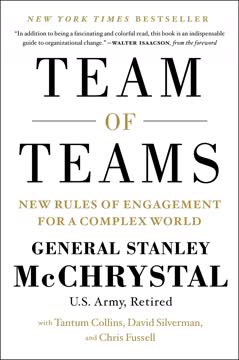Key Takeaways
1. Military Incompetence: A Preventable Tragedy Rooted in Predictable Patterns
Military incompetence is a largely preventable, tragically expensive and quite absorbing segment of human behaviour.
Preventable and Costly. Military incompetence isn't just bad luck; it's a pattern of behavior that can be understood and, to a large extent, prevented. The cost of such failures is not merely financial, but measured in human lives and untold suffering.
Recurring Patterns. Despite changes in technology, geography, or enemy, the characteristics of military incompetence remain remarkably consistent throughout history. This suggests underlying psychological factors at play, rather than mere accidents or isolated incidents of stupidity.
Psychological Principles. Understanding military behavior requires placing it within the context of general psychological principles. This involves examining the minds of those involved, the behavior to which those minds give rise, and the unfortunate side-effects of creating armies and navies.
2. Generalship as Information Processing: Filtering Noise in the Fog of War
In war, each side is kept busy turning its wealth into energy which is then delivered, free, gratis and for nothing, to the other side.
Information and Energy. War is fundamentally about delivering energy and communicating information. While combatants focus on the former, generals are primarily concerned with the latter.
Information Overload. Senior commanders are essentially information-processing devices, receiving, filtering, and transmitting data to make decisions. However, the "fog of war" introduces significant "noise" into the system, overwhelming their limited capacity and leading to errors.
The Human Element. Human decision-makers are not simply computers; their attention, perception, memory, and thinking are all subject to distortion by emotions and motivations. This is especially true in war, where stress and ambiguity are high, making it difficult to maintain objectivity.
3. The Crimean War: A Nadir of Stupidity Fueled by Aristocratic Ineptitude
No army comparable with the British has in modern history ever landed upon a foreign shore more inadequately equipped for invasion.
Incompetence at the Top. The Crimean War was marked by a staggering level of incompetence, particularly among senior officers. Appointments were based on lineage and social standing rather than military expertise, leading to a "nest of noodles" at the highest levels.
Neglect and Suffering. The British Army suffered appalling conditions due to a total disregard for their physical welfare. Men died of cholera, exposure, and malnutrition, while the high command enjoyed comfort and privilege.
Missed Opportunities. Victories like the Battle of Alma were squandered due to a failure to exploit gains and a lack of clear direction from Lord Raglan. The Charge of the Light Brigade stands as a symbol of monumental miscommunication and the tragic consequences of placing troops at the mercy of inept leaders.
4. The Boer War: Repeating Mistakes with Deadly Technological Consequences
It was in sum the second failure of a military machine.
Ignoring Lessons. The Boer War demonstrated a shocking failure to learn from past mistakes, particularly those of the Crimean War. Despite advancements in firepower, British tactics remained outdated and ill-suited to the terrain and the enemy.
Underestimating the Enemy. The Boers, though dismissed as a "rabble of illiterate peasants," proved to be skilled marksmen and agile guerrilla fighters. British commanders consistently underestimated their capabilities, leading to a series of costly defeats.
Leadership Failures. General Sir Redvers Buller, despite his reputation for bravery, proved to be indecisive and prone to making scapegoats of his subordinates. The Battle of Spion Kop became a monument to military ineptitude, highlighting the disastrous consequences of poor planning and communication.
5. The Indian Interlude: Incompetence Transcends Racial Boundaries
But General Walpole took no trouble to reconnoitre; and, without even a cursory examination of the position, launched his men in a blundering and haphazard manner against the strongest face of the fort.
Recurring Patterns. The story of Fort Rooyah during the Indian Mutiny reveals that military incompetence is not limited to conflicts between white races. The same patterns of poor planning, lack of reconnaissance, and underestimation of the enemy were evident in this inter-racial conflict.
The Retreat from Kabul. The British retreat from Kabul in 1842 stands as a testament to the devastating consequences of poor leadership and strategic miscalculations. A British army of 4,500 men was wiped out due to a combination of hostile terrain, severe climate, and the incompetence of General Elphinstone.
Neglect and Indecision. Elphinstone's indecisiveness, lack of imagination, and failure to take basic precautions contributed to the army's vulnerability. The decision to retreat through treacherous mountain passes in the dead of winter proved catastrophic.
6. World War I: Industrialized Slaughter Under the Command of "Donkeys"
The opposing lines congealed, grew solid. The generals on both sides stared at these impotently and without understanding. They went on staring for nearly four years.
Outdated Tactics. The First World War combined the killing power of modern technology with the tactics of previous centuries, resulting in unprecedented levels of carnage. Generals clung to frontal assaults and rigid formations, ignoring the devastating effects of machine guns and artillery.
Misuse of Technology. New inventions like the machine gun and the tank were either dismissed or misused. The emphasis remained on traditional methods, leading to a stalemate of trench warfare and a staggering loss of life.
The Price of Jealousy. The case of General Sir Horace Smith-Dorrien highlights the destructive consequences of personal ambition and jealousy within the high command. His removal from command due to a personal feud with Sir John French cost the British Army dearly.
7. Cambrai: A Glimmer of Innovation Extinguished by Tradition
In the case of the tanks a constant war had to be waged against the apathy, incredulity and shortsightedness of G.H.Q.
The Promise of Tanks. The Battle of Cambrai offered a glimpse of the potential of tanks to break the stalemate of trench warfare. However, the initial success was squandered due to a combination of factors, including the prejudices of reactionary generals and a failure to exploit the breakthrough.
Missed Opportunities. The delay at Flesquières, caused by General Harper's disapproval of tanks, robbed the offensive of its momentum. The reliance on horsed cavalry to exploit the breakthrough proved disastrous.
Ignoring Intelligence. A German counter-attack regained much of the lost ground due to the high command's failure to heed intelligence reports of an impending offensive. The Cambrai débâcle serves as a cautionary tale of the dangers of clinging to tradition and ignoring innovation.
8. The Siege of Kut: A Study in Egomaniacal Neglect
At the risk of marring [the] contemporary description … it should be mentioned that his big bones were particularly well covered, especially in the region of the stomach, and that his square jaw was not especially apparent above a double chin.
Ambition and Misjudgment. The siege of Kut exemplifies the devastating consequences of unchecked ambition and poor judgment. General Townshend's decision to advance beyond Kut, driven by a desire for personal glory, led to the entrapment of his forces and a prolonged period of suffering.
Neglect and Deception. Townshend deliberately misled his superiors about his food supplies, hindering efforts to relieve the siege. He also refused to launch diversionary attacks to aid the relief force.
Self-Preservation. While his men starved and died in captivity, Townshend enjoyed comfortable confinement as a guest of the Turks. His actions highlight the dangers of placing self-interest above the welfare of one's troops.
9. Between the Wars: The Entrenchment of Archaic Military Thinking
It was in sum the second failure of a military machine.
Nostalgia and Neglect. The period between the wars was marked by a clinging to outdated traditions and a neglect of new technologies. The British Army seemed more interested in refighting the Boer War than preparing for future conflicts.
Resistance to Innovation. Machine guns were dismissed as suitable only for use against savages, and training maneuvers emphasized rigid formations and volley fire. The War Office displayed a general resistance to adopting new military techniques.
The Amateur Ethos. A culture of amateurism and disdain for intellectual pursuits permeated the officer corps. Keenness and self-improvement were frowned upon, while polo and pig-sticking were celebrated.
10. World War II: The Price of Complacency and the Seeds of Future Disasters
The whole catering system was inept and inadequate and was even worse in the hospitals than in the camps.
Complacency and Underestimation. The early years of World War II were marked by a dangerous combination of complacency and underestimation of the enemy. The fall of Singapore, in particular, stands as a stark reminder of the consequences of these failings.
Ignoring Warnings. Despite ample evidence of Japanese capabilities, British commanders failed to take basic precautions, such as mining passes and blocking tunnels. The result was a swift and humiliating defeat.
The Human Cost. The loss of Singapore had far-reaching consequences, shattering the myth of European supremacy and condemning thousands to years of misery in Japanese internment camps. The disaster highlights the importance of adaptability, foresight, and a realistic assessment of the enemy.
11. The Authoritarian Personality: A Recurring Theme in Military Incompetence
In a situation where the consequences of wrong decisions are so awesome, where a single bit of irrationality can set a whole train of traumatic events in motion, I do not think that we can be satisfied with the assurance that “most people behave rationally most of the time”.
The Authoritarian Mindset. Military incompetence is often linked to specific personality traits, particularly those associated with authoritarianism. These traits include rigidity, intolerance of ambiguity, hostility towards out-groups, and a preoccupation with power and dominance.
Early Influences. Authoritarian personalities are often the product of strict, status-anxious parents who emphasize obedience and conformity. This upbringing can lead to a suppression of emotions and a reliance on external authority for guidance.
Consequences of Authoritarianism. The authoritarian mindset can lead to a number of detrimental behaviors in military leaders, including a rejection of new information, a tendency to stereotype the enemy, and a disregard for the welfare of their troops.
12. Breaking the Mold: Competence Thrives on Openness and Humanity
No general ever won a war whose conscience troubled him or who did not want ‘to beat his enemy too much’.
The Anti-Authoritarian Commander. In contrast to the rigid and inflexible authoritarian, the most competent military commanders tend to be open-minded, adaptable, and empathetic. They prioritize the welfare of their troops and are willing to challenge conventional wisdom.
Examples of Competence. Figures like Wellington, Nelson, Lawrence, and Slim demonstrate the importance of traits such as intellectual curiosity, moral courage, and a genuine concern for the well-being of their soldiers. These qualities enable them to make sound decisions and inspire loyalty and dedication in their ranks.
The Path Forward. By recognizing the psychological factors that contribute to military incompetence, we can take steps to prevent future disasters. This involves promoting a culture of open-mindedness, critical thinking, and ethical leadership within military organizations.
Last updated:
Review Summary
On the Psychology of Military Incompetence explores military failures through a psychological lens, focusing on British examples. Dixon argues that authoritarian personalities in military leadership often lead to incompetence. The book's first half, detailing historical military disasters, is generally praised. However, the psychological analysis in the second half receives mixed reviews, with some finding it dated and overly reliant on Freudian concepts. Readers appreciate Dixon's wit and insights but criticize the book's organization and narrow focus. Many find parallels to non-military leadership and value the book's examination of dysfunctional leaders.
Similar Books
Download PDF
Download EPUB
.epub digital book format is ideal for reading ebooks on phones, tablets, and e-readers.







